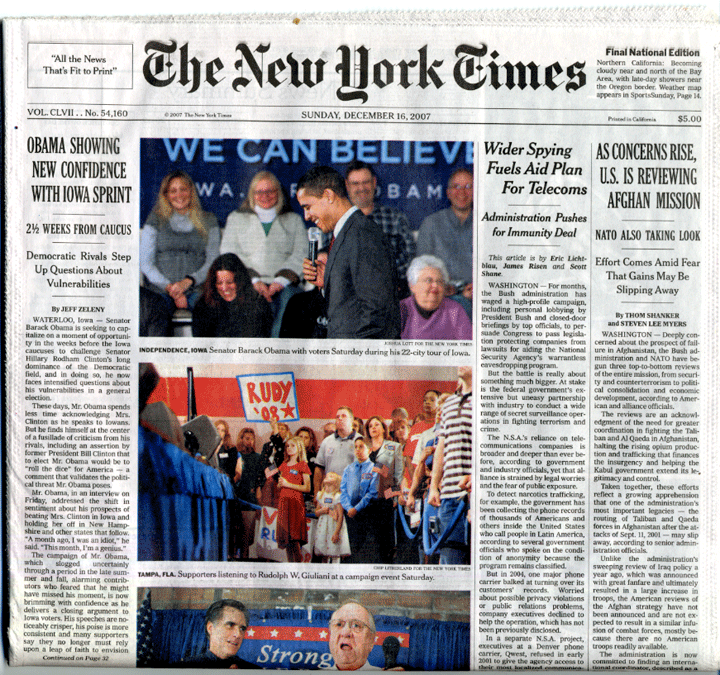Rare Book Monthly
Articles - January - 2008 Issue
Newspapers: Sublimate to Survive
By Bruce McKinney
I have for several months been thinking about the future of newspapers. My family owned weeklies in upstate New York for fifty years and regularly, at the dinner table while I was growing up, talked about the business the way a doctor might talk about a patient. Not surprisingly, long before I learned to drive I was selling "Congratulations to the Graduates," Christmas Greetings and subscriptions by phone. Later I made calls to collect "misplaced" invoices. Occasionally, when pressed, I wrote up football and basketball games and the infrequent track meet but was always partial to the business side of what was hard-scrabble journalism. In the small towns of New Paltz, Highland, Milton, Marlborough and Wallkill where we published, by the time I was 24 and heading off to start my own newspaper in nearby Orange County, I must have spoken to every person several times and sold to them ads and subscriptions. A single call might start out as a subscription renewal, become an update on someone gone to work in New York and end with a birth notice for the coming week. Today the world is characterized by distance and separation. The world I grew up in was open, close and mostly friendly. My ticket to connection was then the newspapers we McKinneys published just as it is today AE Monthly and the Americana Exchange which Mike Stillman and I write for while Jenny, my wife and Diana, Mike's, see to the organizing of more than 200,000 auction lots a year. In the fast unfolding conversion of print and paper that is everyday a wild-west show I explain it this way: we herd cats.
Growing up in the blue-collar newspaper business gave me an appreciation for evaluating chance. I knew almost everyone who bought and sold in Southern Ulster because I went to see them to sell advertising and stayed to hear their stories. I asked about and was often rewarded with the full details of business careers, how they got from there to here, the mistakes they made, the circumstances and luck that defined their lives. I spoke with widows who recalled husbands whose dream it was to own a shop on Main Street, bar owners who hadn't had a drink in twenty years, disillusioned men who sold downtown locations for the money to build better stores on the outskirts that few visited. People had time to talk and I always had time to listen. For my effort I'd bring back a $7.50 ad and use every skill I could muster to make it work. It often did. In time they let me choose the merchandise, set the discount and write the descriptions. For me it was never about the money. It was about getting it right.
In the newspaper business, as in most others, success was a complicated amalgam of opportunity and hard work. The better the opportunity the more competition, the weaker the opportunity the more work. The family newspapers looked easier than they were and so attracted competition while never yielding financial returns commensurate with the work involved. My Mother called it slavery but for someone coming of age it was a PhD in making good choices.
It was there I learned that newspapers, at their best, are an integral part of readers' lives. You'd find a used bike in the classified, read about the proposed new sidewalk, learn that the Fire Department responded to two calls this past week, see your name in the school honor roll, and feel connected. Local newspapers were, like the schools and churches, strands that bound communities together. As an advertising salesman I was one of the bees that carried the pollen and was rewarded with perspective on most of the flowers in the meadow.
























![<b>Sotheby’s, Dec. 16:</b> [Austen, Jane]. A handsome first edition of <i>Sense and Sensibility,</i> the author's first novel. $60,000 to $80,000. <b>Sotheby’s, Dec. 16:</b> [Austen, Jane]. A handsome first edition of <i>Sense and Sensibility,</i> the author's first novel. $60,000 to $80,000.](https://ae-files.s3.amazonaws.com/AdvertisementPhotos/9a74d9ff-42dd-46a1-8bb2-b636c4cec796.png)


![<b>Heritage, Dec. 15:</b> John Donne. <i>Poems, By J. D. With Elegies on the Author's Death.</i> London: M[iles]. F[lesher]. for John Marriot, 1633. <b>Heritage, Dec. 15:</b> John Donne. <i>Poems, By J. D. With Elegies on the Author's Death.</i> London: M[iles]. F[lesher]. for John Marriot, 1633.](https://ae-files.s3.amazonaws.com/AdvertisementPhotos/8caddaea-4c1f-47a7-9455-62f53af36e3f.jpg)




